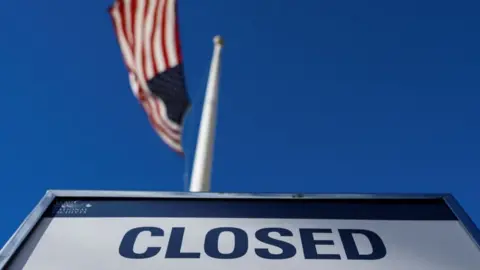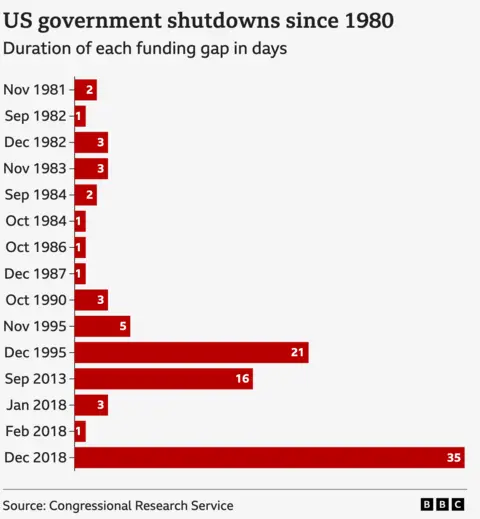Who is affected by the US government shutdown?

 getty images
getty imagesThe US is headed for another government shutdown after the lower house of Congress failed to pass a spending bill to keep federal agencies open.
Unless Republicans and Democrats agree on a way forward, the funding will expire at midnight Friday.
Here’s how we got here and what it means for Americans and Donald Trump.
Why is this shutdown looming?
Many federal government agencies rely on annual funding approved by Congress.
Each year, these agencies submit their requests, which must be passed by Congress, and the President must sign budget legislation for the next fiscal year.
If no agreement is reached, all non-essential, discretionary functions of the US government will stop.
In September, both parties agreed to a bill to keep government funding until December 20.
This week, three days before lawmakers went on recess, the Speaker of the House of Representatives, Republican Mike Johnson, released a bill to extend funding through March.
This was agreed upon with the Democratic leadership but included some measures such as pay increases for lawmakers that some Republicans were unhappy with.
Trump’s ally, tech billionaire Elon Musk, opposed it, and then the president-elect indicated he wanted his party to kill it, which is what happened.
A second, slower bill reached the House floor Thursday night, but failed to get enough votes to pass.
Who is affected by government shutdown?
If no agreement is reached by midnight, there will be the first US shutdown since early 2019.
Essential workers are continuing as normal, some of them without pay, while government employees deemed non-essential have been placed on temporary unpaid leave.
Border security, hospital medical care, law enforcement and air-traffic control will continue.
But services like food assistance programs, federally funded preschools, student loan and food inspection issuance, and national parks will be reduced or closed.
While Social Security and Medicare checks are sent, benefits verification and card issuance stops.
If the standoff drags on, the journey may also be delayed.
“An extended shutdown could mean longer wait times at airports,” said Transportation Security Administration spokesman Carter Langston.
Why did Elon Musk oppose the bill?
The Tesla boss has been tasked with identifying spending cuts by co-leading the proposed Department of Government Efficiency (DOGE).
It’s not an official government department but they have vowed to save $2tn.
On Wednesday he made dozens of posts on his proprietary platform X to express his displeasure with Mike Johnson’s bill.
He made some false statements about what was in the bill, calling it criminal and outrageous.
After Musk objected, Trump and incoming Vice President J.D. Vance delivered the final blow to Johnson’s deal that evening.
They said in a joint statement that they wanted streamlined legislation without the Democratic-backed provisions included by Johnson.
He also called on Congress to raise or eliminate the debt ceiling, which sets how much the government can borrow to pay its bills.
what happens now?
Johnson promised Friday to find a solution, so there will be plenty of wrangling on Capitol Hill as time goes on.
But they will need Democratic votes to get the support needed in the House to pass it.
Democrats say they will only support the original bill that Trump and Musk opposed.
If no agreement is reached, US federal agencies will close at midnight.
How common are shutdowns in the US?
Absolutely normal. President Ronald Reagan oversaw eight shutdowns during his tenure—though all were relatively brief.
And there were three when Donald Trump was president, including the longest 36-day spell in history that ended in January 2019.
This happened because of disagreements over funding for a wall on the Mexican border.
Congressional Budget Office (CBO) It is estimated that this reduced economic output About $11 billion, including $3 billion he never got back.

A shutdown over the budget is almost unique in American politics.
Under the American system, the different branches of government have to reach an agreement on spending plans before they become law.
In most countries, budget votes themselves become votes of confidence in the government. But since the US has equal and often divided branches of government, this is not the case.
Why does Trump want to raise the debt ceiling?
Also known as the debt ceiling, this is a law that restricts the total amount of money a government can borrow to pay its bills.
This includes payments to federal employees, the military, Social Security and Medicare, as well as interest on the national debt and tax refunds.
From time to time, the US Congress votes to raise or suspend limits so that it can borrow more.
Trump’s addition of this condition to the agreement was an unexpected demand that has made it difficult for right-wing Republicans who often rail against increased government spending to support the bill.
Despite the promise of efficiency drives, the loan limit will have to be increased in the coming months.
But by seeking to do so now, some analysts believe Trump is signaling the cost of his proposed tax cuts and tighter border restrictions will test the limits of the ceiling. And he prefers the fight over growth to happen before he takes office.
Democrats are generally in favor of raising the debt ceiling without conditions but they are in no mood to help Republicans now.
The risk for Trump is that the mini-insurrection will be destroyed, the cloak of invincibility he has worn since the election.
And it raises questions about how easily his party will be able to fulfill campaign promises that are required by law.






